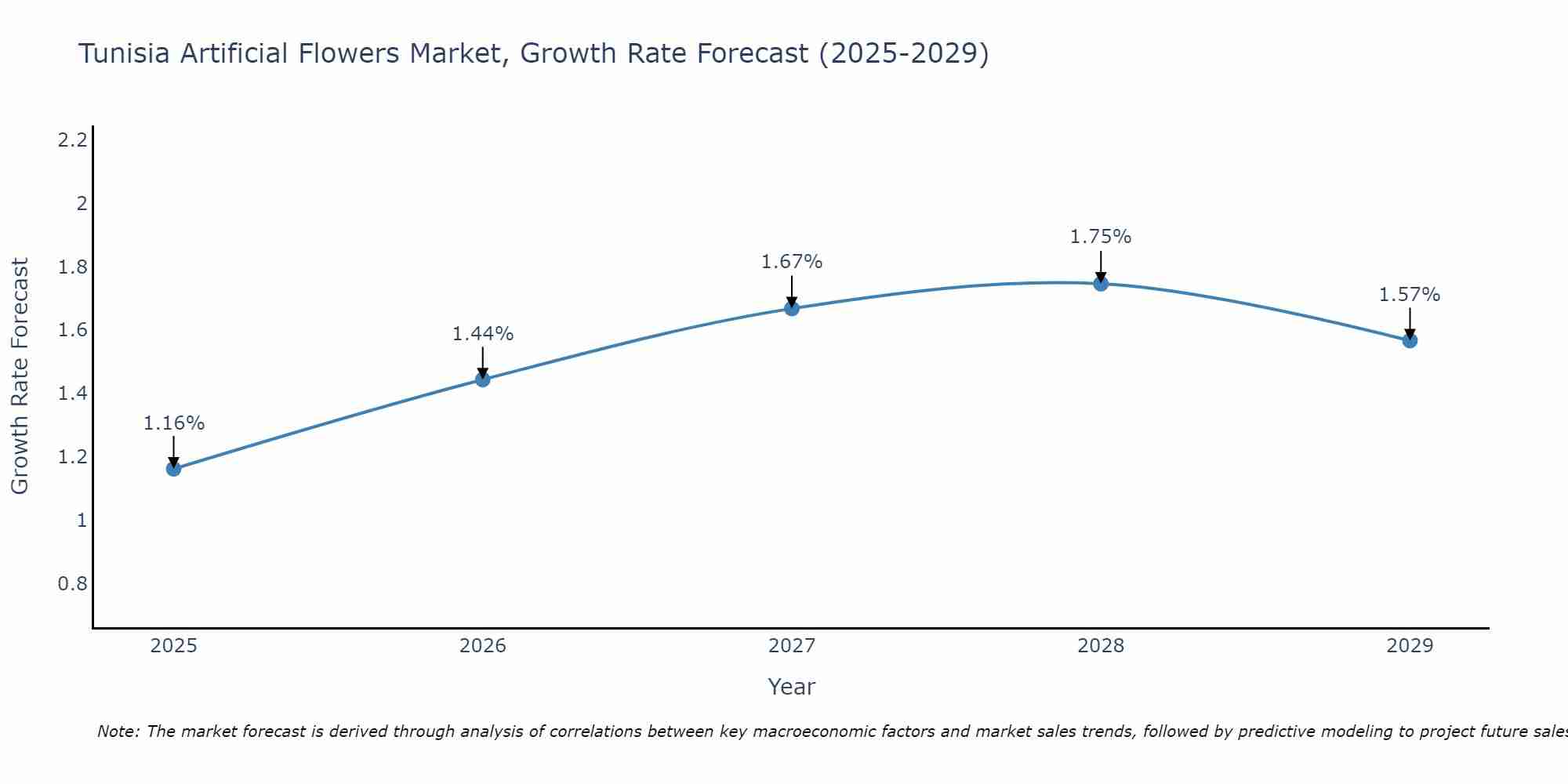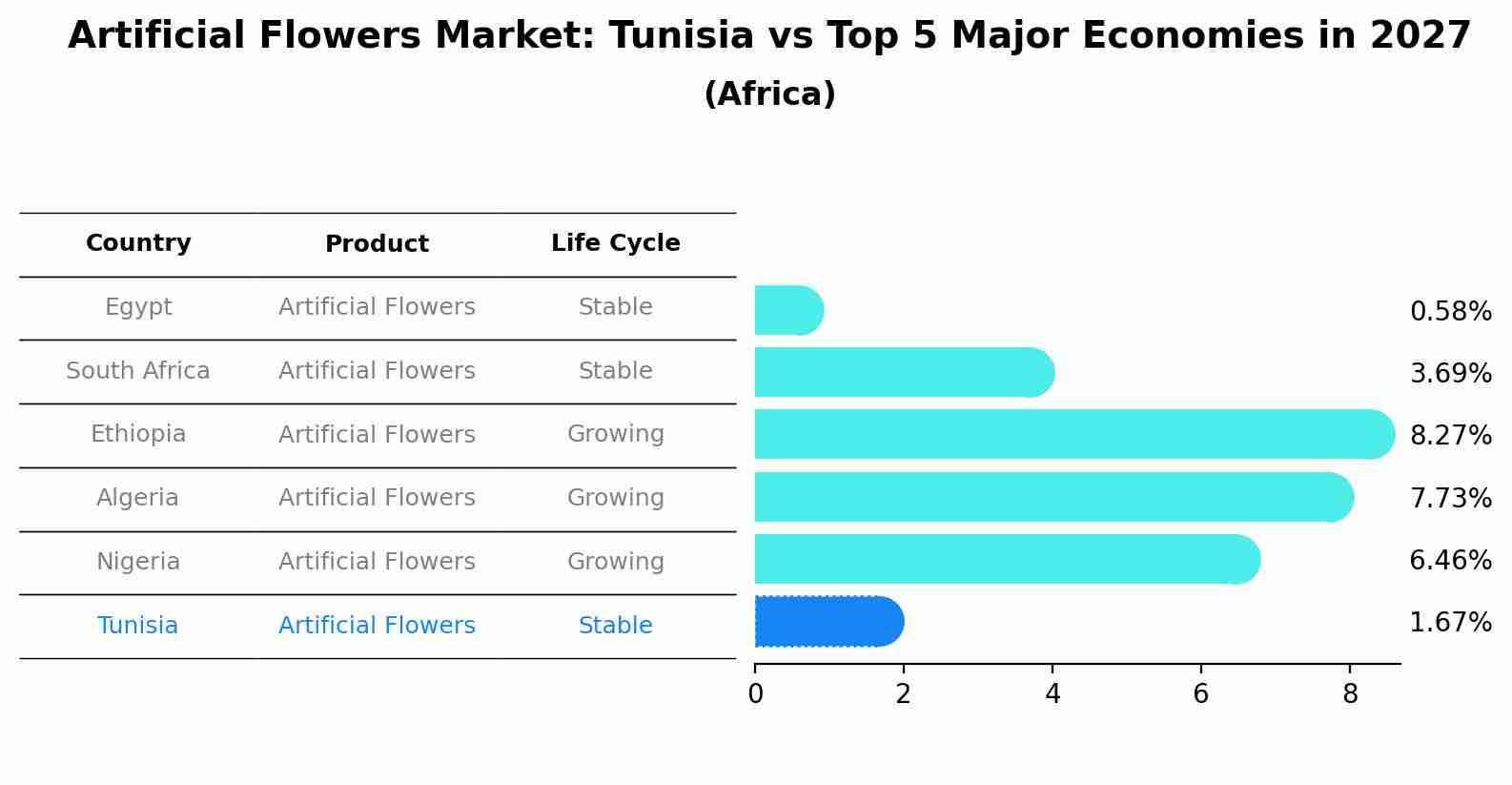Tunisia Artificial Flowers Market Outlook | Share, Industry, Trends, Value, Forecast, Growth, COVID-19 IMPACT, Size, Companies, Revenue & Analysis
| Product Code: ETC380214 | Publication Date: Aug 2022 | Updated Date: Jul 2025 | Product Type: Market Research Report | |
| Publisher: 6Wresearch | Author: Vasudha | No. of Pages: 75 | No. of Figures: 35 | No. of Tables: 20 |
Tunisia Artificial Flowers Market Size Growth Rate
The Tunisia Artificial Flowers Market is projected to witness mixed growth rate patterns during 2025 to 2029. Starting at 1.16% in 2025, the market peaks at 1.75% in 2028, and settles at 1.57% by 2029.

Artificial Flowers Market: Tunisia vs Top 5 Major Economies in 2027 (Africa)
By 2027, Tunisia's Artificial Flowers market is forecasted to achieve a stable growth rate of 1.67%, with Egypt leading the Africa region, followed by South Africa, Ethiopia, Algeria and Nigeria.

Tunisia Artificial Flowers Market Synopsis
The Tunisia Artificial Flowers Market is experiencing steady growth driven by factors such as increasing demand for artificial flowers in home decor, events, and commercial spaces. The market offers a wide variety of artificial flowers in different colors, sizes, and types to cater to diverse consumer preferences. Key players in the market are focusing on product innovation, quality improvement, and expanding distribution channels to gain a competitive edge. Rising disposable income, changing lifestyle trends, and the convenience of maintenance-free artificial flowers are further fueling market growth. Additionally, the growing popularity of artificial flowers as a sustainable and long-lasting alternative to fresh flowers is contributing to the market`s expansion. Overall, the Tunisia Artificial Flowers Market presents opportunities for both local and international vendors to leverage the increasing demand for artificial floral products in the region.
Tunisia Artificial Flowers Market Trends
The Tunisia Artificial Flowers Market is experiencing a growing demand for high-quality, realistic artificial flowers that closely mimic their fresh counterparts. Consumers are increasingly looking for artificial flowers that are durable, low-maintenance, and long-lasting, making them a cost-effective and sustainable alternative to fresh flowers. Additionally, there is a rising interest in eco-friendly artificial flowers made from sustainable materials to cater to the environmentally conscious consumer segment. Customization options, such as bespoke arrangements and unique designs, are also becoming popular among customers looking to add a personal touch to their décor. Overall, the market is witnessing a shift towards premium artificial flowers that offer both aesthetic appeal and practicality.
Tunisia Artificial Flowers Market Challenges
In the Tunisia Artificial Flowers Market, some challenges faced include competition from low-cost imported artificial flowers, maintaining product quality to meet consumer expectations, and limited consumer awareness and acceptance of artificial flowers as a substitute for fresh flowers. Additionally, fluctuations in raw material prices can impact production costs and pricing strategies for local manufacturers. With the growing trend of sustainability and eco-friendliness, there is also a challenge in ensuring that artificial flowers are perceived as environmentally friendly and recyclable. Market players in Tunisia need to focus on innovation, quality control, marketing efforts to educate consumers, and strategic pricing strategies to overcome these challenges and remain competitive in the artificial flowers market.
Tunisia Artificial Flowers Market Investment Opportunities
The Tunisia Artificial Flowers Market offers attractive investment opportunities due to increasing consumer interest in home decor and the growing trend of using artificial flowers for various events and occasions. With a rising disposable income and changing lifestyle patterns, there is a demand for high-quality artificial flowers that mimic the appearance of real flowers. Investors can capitalize on this trend by investing in manufacturing facilities, distribution channels, and online retail platforms to cater to the growing market. Additionally, there is potential for innovation in materials and designs to differentiate products and appeal to a wider customer base. Overall, the Tunisia Artificial Flowers Market presents a promising investment landscape for those looking to tap into the country`s evolving consumer preferences and lifestyle trends.
Jordan Agar Market Government Policies
The Tunisian government has put in place several policies related to the artificial flowers market, with a focus on promoting local manufacturing and ensuring product quality standards. Import regulations and tariffs are enforced to protect domestic producers and encourage self-sufficiency in the industry. Additionally, there are guidelines in place to ensure that artificial flowers meet safety and environmental standards, promoting consumer trust and sustainability. The government also offers support and incentives to local businesses in the artificial flowers sector, such as access to funding, training programs, and export assistance. Overall, these policies aim to stimulate growth in the Tunisian artificial flowers market, enhance competitiveness, and uphold quality standards both locally and internationally.
Tunisia Artificial Flowers Market Future Outlook
The Tunisia Artificial Flowers Market is poised for steady growth in the coming years due to various factors such as increasing demand for low-maintenance and long-lasting floral décor options, rising disposable incomes, and a growing trend towards sustainable and eco-friendly products. The market is expected to benefit from the convenience and cost-effectiveness of artificial flowers compared to real flowers, especially in commercial settings like hotels, restaurants, and event planning industries. Additionally, advancements in technology and manufacturing processes are likely to result in more realistic and high-quality artificial flower products, further driving market expansion. Overall, the Tunisia Artificial Flowers Market is projected to experience favorable growth opportunities and increasing consumer acceptance in the foreseeable future.
Key Highlights of the Report:
- Tunisia Artificial Flowers Market Outlook
- Market Size of Tunisia Artificial Flowers Market, 2021
- Forecast of Tunisia Artificial Flowers Market, 2031
- Historical Data and Forecast of Tunisia Artificial Flowers Revenues & Volume for the Period 2018 - 2031
- Tunisia Artificial Flowers Market Trend Evolution
- Tunisia Artificial Flowers Market Drivers and Challenges
- Tunisia Artificial Flowers Price Trends
- Tunisia Artificial Flowers Porter's Five Forces
- Tunisia Artificial Flowers Industry Life Cycle
- Historical Data and Forecast of Tunisia Artificial Flowers Market Revenues & Volume By Material Type for the Period 2018 - 2031
- Historical Data and Forecast of Tunisia Artificial Flowers Market Revenues & Volume By Clay & Porcelain for the Period 2018 - 2031
- Historical Data and Forecast of Tunisia Artificial Flowers Market Revenues & Volume By Cotton & Silk for the Period 2018 - 2031
- Historical Data and Forecast of Tunisia Artificial Flowers Market Revenues & Volume By Leather & Nylon for the Period 2018 - 2031
- Historical Data and Forecast of Tunisia Artificial Flowers Market Revenues & Volume By Paper & Wax for the Period 2018 - 2031
- Historical Data and Forecast of Tunisia Artificial Flowers Market Revenues & Volume By Plastic & Polyester for the Period 2018 - 2031
- Historical Data and Forecast of Tunisia Artificial Flowers Market Revenues & Volume By Application for the Period 2018 - 2031
- Historical Data and Forecast of Tunisia Artificial Flowers Market Revenues & Volume By Commercial for the Period 2018 - 2031
- Historical Data and Forecast of Tunisia Artificial Flowers Market Revenues & Volume By Residential for the Period 2018 - 2031
- Tunisia Artificial Flowers Import Export Trade Statistics
- Market Opportunity Assessment By Material Type
- Market Opportunity Assessment By Application
- Tunisia Artificial Flowers Top Companies Market Share
- Tunisia Artificial Flowers Competitive Benchmarking By Technical and Operational Parameters
- Tunisia Artificial Flowers Company Profiles
- Tunisia Artificial Flowers Key Strategic Recommendations
Frequently Asked Questions About the Market Study (FAQs):
- Single User License$ 1,995
- Department License$ 2,400
- Site License$ 3,120
- Global License$ 3,795
Search
Thought Leadership and Analyst Meet
Our Clients
Related Reports
- Canada Oil and Gas Market (2026-2032) | Share, Segmentation, Value, Industry, Trends, Forecast, Analysis, Size & Revenue, Growth, Competitive Landscape, Outlook, Companies
- Germany Breakfast Food Market (2026-2032) | Industry, Share, Growth, Size, Companies, Value, Analysis, Revenue, Trends, Forecast & Outlook
- Australia Briquette Market (2025-2031) | Growth, Size, Revenue, Forecast, Analysis, Trends, Value, Share, Industry & Companies
- Vietnam System Integrator Market (2025-2031) | Size, Companies, Analysis, Industry, Value, Forecast, Growth, Trends, Revenue & Share
- ASEAN and Thailand Brain Health Supplements Market (2025-2031) | Strategy, Consumer Insights, Analysis, Investment Trends, Opportunities, Growth, Size, Share, Industry, Revenue, Segments, Value, Segmentation, Supply, Forecast, Restraints, Outlook, Competition, Drivers, Trends, Demand, Pricing Analysis, Competitive, Strategic Insights, Companies, Challenges
- ASEAN Bearings Market (2025-2031) | Strategy, Consumer Insights, Analysis, Investment Trends, Opportunities, Growth, Size, Share, Industry, Revenue, Segments, Value, Segmentation, Supply, Forecast, Restraints, Outlook, Competition, Drivers, Trends, Demand, Pricing Analysis, Competitive, Strategic Insights, Companies, Challenges
- Europe Flooring Market (2025-2031) | Outlook, Share, Industry, Trends, Forecast, Companies, Revenue, Size, Analysis, Growth & Value
- Saudi Arabia Manlift Market (2025-2031) | Outlook, Size, Growth, Trends, Companies, Industry, Revenue, Value, Share, Forecast & Analysis
- Uganda Excavator, Crane, and Wheel Loaders Market (2025-2031) | Strategy, Consumer Insights, Analysis, Investment Trends, Opportunities, Growth, Size, Share, Industry, Revenue, Segments, Value, Segmentation, Supply, Forecast, Restraints, Outlook, Competition, Drivers, Trends, Demand, Pricing Analysis, Competitive, Strategic Insights, Companies, Challenges
- Rwanda Excavator, Crane, and Wheel Loaders Market (2025-2031) | Strategy, Consumer Insights, Analysis, Investment Trends, Opportunities, Growth, Size, Share, Industry, Revenue, Segments, Value, Segmentation, Supply, Forecast, Restraints, Outlook, Competition, Drivers, Trends, Demand, Pricing Analysis, Competitive, Strategic Insights, Companies, Challenges
Industry Events and Analyst Meet
Whitepaper
- Middle East & Africa Commercial Security Market Click here to view more.
- Middle East & Africa Fire Safety Systems & Equipment Market Click here to view more.
- GCC Drone Market Click here to view more.
- Middle East Lighting Fixture Market Click here to view more.
- GCC Physical & Perimeter Security Market Click here to view more.
6WResearch In News
- Doha a strategic location for EV manufacturing hub: IPA Qatar
- Demand for luxury TVs surging in the GCC, says Samsung
- Empowering Growth: The Thriving Journey of Bangladesh’s Cable Industry
- Demand for luxury TVs surging in the GCC, says Samsung
- Video call with a traditional healer? Once unthinkable, it’s now common in South Africa
- Intelligent Buildings To Smooth GCC’s Path To Net Zero


















